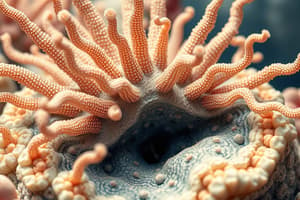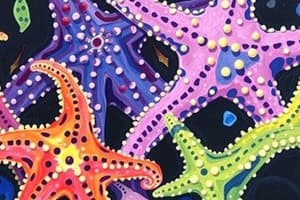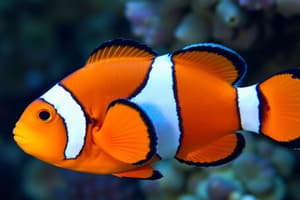Podcast
Questions and Answers
Which of the following is NOT a characteristic of a Clownfish, based on the text provided?
Which of the following is NOT a characteristic of a Clownfish, based on the text provided?
- They have a mucus coating that prevents the anemone from recognizing them as food.
- They live in symbiotic relationships with anemones.
- They are a type of pufferfish. (correct)
- They are sequential hermaphrodites.
What is unique about the diet of adult Green Sea Turtles compared to other sea turtles?
What is unique about the diet of adult Green Sea Turtles compared to other sea turtles?
- They are exclusively herbivorous. (correct)
- They consume small crustaceans.
- They primarily eat plankton.
- They eat jellyfish.
What is the primary reason why Porcupinefish can dramatically increase their size?
What is the primary reason why Porcupinefish can dramatically increase their size?
- They possess a specialized air sac.
- They inflate their gills.
- They have a large, expandable stomach.
- They ingest air or water. (correct)
Why would Pearl, the Pink Flapjack Octopus, not be able to survive in the surface waters of the Great Barrier Reef?
Why would Pearl, the Pink Flapjack Octopus, not be able to survive in the surface waters of the Great Barrier Reef?
Which of the following is a characteristic shared by both the Moorish Idol and the Royal Gramma?
Which of the following is a characteristic shared by both the Moorish Idol and the Royal Gramma?
What is a distinguishing feature about the breeding process of the Queensland Seahorse?
What is a distinguishing feature about the breeding process of the Queensland Seahorse?
What strategy does a Regal Tang utilize to escape danger?
What strategy does a Regal Tang utilize to escape danger?
Which fish is considered to be a peaceful and often kept in aquariums because it is known to clean parasites off other fish?
Which fish is considered to be a peaceful and often kept in aquariums because it is known to clean parasites off other fish?
Flashcards
Clown Anemonefish
Clown Anemonefish
A species that starts life as a male and can become female, survives anemone poison with a protective mucus coating.
Green Sea Turtle
Green Sea Turtle
The second largest sea turtle, up to 700 lbs, mainly herbivorous as adults while juveniles are carnivorous.
Spotted Porcupinefish
Spotted Porcupinefish
A blowfish known for inflating its body by taking in air or water, resulting in sharp spines; some are toxic.
Pink Flapjack Octopus
Pink Flapjack Octopus
Signup and view all the flashcards
Moorish Idol
Moorish Idol
Signup and view all the flashcards
Royal Gramma
Royal Gramma
Signup and view all the flashcards
Queensland Seahorse
Queensland Seahorse
Signup and view all the flashcards
Regal Tang
Regal Tang
Signup and view all the flashcards
Study Notes
Clownfish (Amphiprion ocellaris)
- Sequential hermaphrodites: Develop from male to female.
- Anemone survival: Mucus coating of sugar, not protein, avoids anemone's nematocysts.
Green Sea Turtle (Chelonia mydas)
- Second largest sea turtle, up to 700 lbs.
- Primarily herbivorous as adults, but juveniles eat invertebrates.
Spotted Porcupinefish (Diodon hystrix)
- Related to burrfishes, not pufferfish (different family).
- Inflate drastically with air/water, extending sharp spines.
- Some species accumulate toxins from bacteria in their diet.
Pink Flapjack Octopus (Opisthoteuthis californiana)
- Deep-water species (500-1,500m).
- Unlikely to survive in surface waters of the Great Barrier Reef.
Moorish Idol (Zanclus cornutus)
- Only species in its family (Zanclidae).
- Native to Pacific and Indian Ocean coral reefs.
- Difficult to keep in aquariums.
Royal Gramma (Gramma loreto)
- Common reef fish, primarily feeds on plankton.
- Can clean parasites from other fish.
- Peaceful, often kept in aquariums.
Queensland Seahorse (Hippocampus queenslandicus)
- Inhabits bottom rubble and seagrasses.
- Feeds on plankton and small crustaceans.
- Males brood eggs in a pouch.
Regal Tang (Paracanthurus hepatus)
- Can become semi-transparent for camouflage.
- Used as bait fish, valuable aquarium fish.
- Potential ciguatera poisoning if consumed.
Spotted Eagle Ray (Aetobatus narinari)
- Near-threatened species due to overharvesting.
- Inhabits shallow inshore waters and coral reefs.
- May leap out of water for various reasons (escape, prey, parasites, mating).
Studying That Suits You
Use AI to generate personalized quizzes and flashcards to suit your learning preferences.




